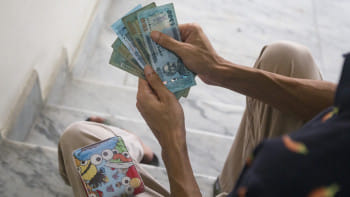Top 5 Inflations in History

Inflation is the bad boy of economic phenomena.
It's so bad that it even has an evil spawn called "stagflation". We'll discuss that some other day. But like most proper villains, inflation has a long backstory. In fact, back in the day when there weren't so many economists scurrying around, some people used to think printing more money equals more money in general.
Once we had economists, there would no longer be a problem and no inflation would ever happen again, right? WRONG!
Here are 5 instances of terrible inflation from both recent history and way back in the past.
Weimar Germany in the 1920s

The Germans were absolutely losing it after being handed their sorry bottoms in defeat after the First World War. They lost a big chunk of their territory, and were forced to pay crazy amounts of money to the Entente countries in reparations. They were already in huge debt after borrowing money to fund the war they lost, and now, to make matters worse, they were having to pay reparation in US dollars, causing the country to sink deep into inflation.
Things went from bad to worse when no one would sell them dollars for their rapidly destabilising German Papiermark, and in November 1923, a loaf of bread in Berlin cost 200,000,000,000 marks. I'm not even sure I put the right number of zeros on there, but I think that does a good job proving the point.
Venezuela RIGHT NOW

Reading about the hyperinflation in Venezuela is like reading about a government fixated on outdoing itself year after year. Some people shoot themselves in the foot; the Venezuelan government shot themselves in the foot, dove into crocodile-infested waters, and then drove itself off a cliff by devaluing the currency repeatedly in the early 2010s.
The regime in charge never shied off spending tremendous amounts of money behind its propaganda department (clearly, that worked). In 2014, the inflation rate was a nice 69 percent, the highest in the world. Since then, it has spiralled out of control, at one point estimated at 10,000,000 percent in 2019.
This is an ongoing crisis and is the cause of a humanitarian refugee crisis between the borders of many countries in South and Central America.
Zimbabwe in the 2000s

Other than beating Bangladesh regularly in cricket, Zimbabwe in the 2000s was a place where money went to die. Why? I have two words for you. Robert Mugabe.
Other than being the subject of terribly fake internet "facts", this guy was also very good at running a country to the ground. His policies crippled Zimbabwe's economy, called down the gauntlet of Western sanctions (not everyone is Russian, sanctions work sometimes), and resulted in inflation so bad that I had to come across the word "sextillion" when reading up on it. In late 2008, 89.7 sextillion percent was the rate of inflation in Zimbabwe year-on-year.
I don't think I want to find out what that means. I just know that at some point, things got so bad that an ATM gave a "data overflow error". Bad engineering? Maybe. Bad economics? For sure.
When Mansa Musa visited Egypt

What happens when the richest man in history visits one of the most populous places in the world and he's also the most philanthropic that philanthropists have ever managed to be? Chaos!
In the year 1324, on his way to perform the Hajj in Makkah, Mansa Musa of the Mali empire spent so much gold and gave so much away that the price of gold in Cairo crashed. And then it stayed that way for 10 whole years. A US-based technology company called SmartAsset.com says that this caused around USD 1,500,000,000 of losses across the Middle East (although I'm not sure why they say this or why I believe them).
This story is so amazing, it deserves telling. Mansa Musa is a tremendous character. He's playable in the video game Sid Meier's Civilization VI, and he's the only rich person I can say I like. Probably because I've never met him.
Argentina since… forever?

This story is just cursed, to be honest. Argentina is special in the art of inflation not because of how intense it is, but because of its sustainability. Theirs is a long story, and it's amazing how consistently they've been bad at maintaining a stable currency.
They are not a poor nation by any means, classified as a developing economy by whoever has the time to do these classifications. They are also the second largest economy in Latin America, which is quite a feat considering they have had double-digit inflation during most years since the 1960s. They even had negative inflation for a while during the turn of the millennia, but like the opposite of a phoenix, they burned themselves into ashes again.
Right now, their inflation is at a 20-year high, over 50 percent. But I don't think Argentines are scared. Humans are resilient. They can get used to anything. So much so that in Argentina, superstores have electronic price tags, to deal with the fast changing price of goods.
And there you have it. These are my top 5 inflations in history. Do you disagree with me? Think I've missed something? I don't care. I care about the economy. Read the news, please. And like, best wishes, I guess.
Azmin Azran is a sub-editor at SHOUT.

 For all latest news, follow The Daily Star's Google News channel.
For all latest news, follow The Daily Star's Google News channel. 









Comments